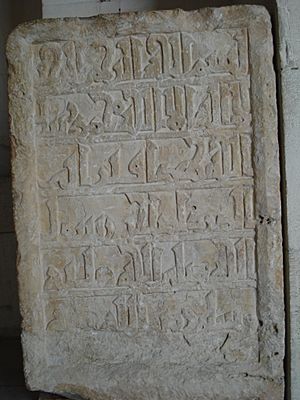Abu al-Darda facts for kids
Quick facts for kids
Hakīm ul Ummāh
Abu al-Darda
|
|
|---|---|

The purported gravestone of Abu al-Darda in the Bab al-Saghir cemetery
|
|
| Born |
Uwaymir
|
| Died | c. 652 |
| Burial place | Bab al-Saghir, Damascus |
| Known for | Companion of Muhammad Quran instructor Qadi of Damascus]] |
| Spouse(s) | Umm al-Darda al-Kubra Umm al-Darda as-Sughra |
| Family | Balharith (family) Banu Khazraj (tribe) |
Abu al-Darda al-Ansari was an important companion of the Islamic prophet Muhammad. His full name was Uwaymir ibn Zayd ibn Qays al-Khazraji. He lived a long time ago, dying around the year 652 CE. Abu al-Darda was famous for two main things: he was a top teacher of the Quran (the holy book of Islam), and he was the very first judge, or qadi, in the city of Damascus. He was married to another companion, Umm al-Darda al-Kubra.
Contents
Who Was Abu al-Darda?
Abu al-Darda's full name was Uwaymir ibn Zayd ibn Qays. He belonged to the Balharith family, which was part of the Khazraj tribe in a city called Yathrib. This city is now known as Medina.
When the Islamic prophet Muhammad moved from Mecca to Yathrib, the people of the Khazraj tribe and another tribe called Banu Aws welcomed him. These two tribes together became known as the Ansar, which means 'Helpers'. Muhammad's followers who moved with him from Mecca were called the Muhajirun ('Emigrants').
His Conversion to Islam
Many in Abu al-Darda's family became Muslim soon after Muhammad arrived in Medina. However, Abu al-Darda, who was a young man at the time, converted later. He became Muslim after the Battle of Badr in 624 CE. This was a big victory for the Muslims against their opponents, the Quraysh tribe.
Abu al-Darda is generally seen as a close companion of Prophet Muhammad. He might have also fought alongside the Muslims in the Battle of Uhud in 627 CE. Prophet Muhammad often created special bonds, like brotherhoods, between the Ansar and Muhajirun. Abu al-Darda was made a 'brother' to Salman al-Farisi.
His Life and Teachings
Before becoming Muslim, Abu al-Darda was a merchant. However, after he converted, he decided to stop his business. He felt that trading took too much time away from his religious duties. He became known as a very religious and humble person. People saw him as a wise leader in the early Muslim community.
Abu al-Darda was especially respected for his deep knowledge of the Quran. He was one of the few people who collected and learned parts of the Quran directly from Prophet Muhammad during Muhammad's lifetime.
His Role in Damascus
Later, under the guidance of Caliph Umar (who ruled from 634 to 644 CE), Abu al-Darda was given an important job. The governor of Islamic Syria, Mu'awiya ibn Abi Sufyan, appointed him as the first qadi (judge) of Damascus. Damascus was the main city in Syria.
In Damascus, Abu al-Darda often gathered students at the city's mosque. He taught them about the Quran. Because of his teaching, he is considered the founder of the Damascus School of Quranic studies. He passed away in Damascus in 652 CE and was buried near the city's Bab al-Saghir gate, next to his wife, Umm al-Darda.
His Lasting Influence
Abu al-Darda's teachings had a huge impact. For almost a hundred years after his death, his students and their students held the position of qadi (judge) in Damascus. His chosen student, Fadala ibn Ubayd al-Ansari, became the next judge and served until 673 CE.
During the rule of the Umayyad Caliphate (from 661 to 750 CE), almost all the judges in Damascus were either taught by Abu al-Darda himself or by his students. His son, Bilal, also served as a judge. Even later scholars were influenced by his teachings, showing how important Abu al-Darda was to the development of Islamic knowledge in Syria.
See also
- 7th century in Lebanon § Ṣaḥāba who have visited Lebanon

